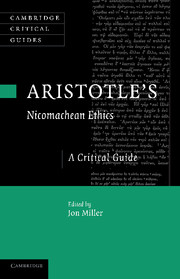Book contents
- Frontmatter
- Contents
- Contributors
- Acknowledgments
- Abbreviations and transliteration
- Introduction
- Part I Textual issues
- Part II Happiness
- Part III Philosophical psychology
- Chapter 5 Aristotle???s definition of non-rational pleasure and pain and desire
- Chapter 6 Non-rational desire and Aristotle???s moral psychology
- Chapter 7 Aristotle, agents, and actions
- Chapter 8 Perfecting pleasures
- Chapter 9 Inappropriate passion
- Part IV Virtues
- Bibliography
- Index
Chapter 8 - Perfecting pleasures
The metaphysics of pleasure in Nicomachean Ethicsx
Published online by Cambridge University Press: 07 September 2011
- Frontmatter
- Contents
- Contributors
- Acknowledgments
- Abbreviations and transliteration
- Introduction
- Part I Textual issues
- Part II Happiness
- Part III Philosophical psychology
- Chapter 5 Aristotle???s definition of non-rational pleasure and pain and desire
- Chapter 6 Non-rational desire and Aristotle???s moral psychology
- Chapter 7 Aristotle, agents, and actions
- Chapter 8 Perfecting pleasures
- Chapter 9 Inappropriate passion
- Part IV Virtues
- Bibliography
- Index
Summary
Babbling about pleasure
According to G. E. M. Anscombe, pleasure was the topic that finally and “astonishingly reduced Aristotle to babble, since for good reasons he both wanted pleasure to be identical with and to be different from the activity that it is pleasure in.” That is by any measure a harsh judgment – babble, she says: inarticulate, incomprehensible, childish prattle.
She does allow that Aristotle was reduced to this sorry state for good reasons; so, she evidently thinks that there is a partially exculpatory diagnosis for his woes. Woes he has, however: as she represents him, Aristotle fumbles and stumbles over himself twice over. He first identifies pleasure with an activity and then denies that it is an activity. That is perhaps not so bad in itself, since he may after all simply have changed his mind; but when he denies that pleasure is an activity, he does so for all the wrong reasons. Instead of relying on the sensible thought that pleasure is not an activity but rather a feeling, Aristotle instead offers a bewildering corrective: “Pleasure,” he says, “perfects the activity (energeia), not in the way a state (hexis) does, by being in the activity, but as a sort of supervening end (telos)” (teleioi de tên energeian hê hêdonê ouk hôs hê hexis enuparchousa, all’ hôs epiginomenon ti telos; E.N. 1174b31–33). If Aristotle is not babbling here, then neither is his meaning exactly pellucid. At the very least, it seems an overly technical treatment of what is at root a perfectly familiar phenomenon. Pleasure, we may be assured, is a feeling, a welcome sensation of some sort, a sensation of satisfaction or gratification, in general an enjoyable or delightful experience. Aristotle’s account of pleasure – if it is intelligible at all – seems at the very least needlessly baroque.
- Type
- Chapter
- Information
- Aristotle's Nicomachean EthicsA Critical Guide, pp. 191 - 210Publisher: Cambridge University PressPrint publication year: 2011
- 6
- Cited by



